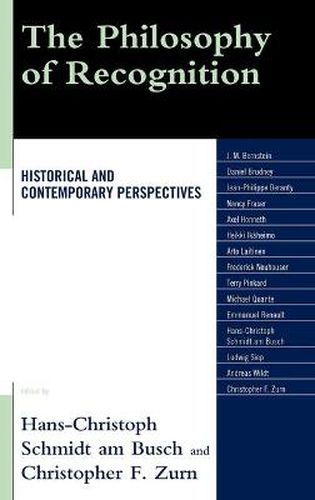Readings Newsletter
Become a Readings Member to make your shopping experience even easier.
Sign in or sign up for free!
You’re not far away from qualifying for FREE standard shipping within Australia
You’ve qualified for FREE standard shipping within Australia
The cart is loading…






The theory of recognition is now a well-established and mature research paradigm in philosophy, and it is both influential in and influenced by developments in other fields of the humanities and social sciences. From debates in moral philosophy about the fundamental roots of obligation, to debates in political philosophy about the character of multicultural societies, to debates in legal theory about the structure and justification of rights, to debates in social theory about the prospects and proper objects of critical theory, to debates in ontology, philosophical anthropology and psychology about the structure of personal and group identities, theories based on the concept of intersubjective recognition have staked out central positions. At the same time, contemporary theories of recognition are strongly, perhaps indissociably, connected to themes in the history of philosophy, especially as treated in German idealism. This volume compromises a collection of original papers by eminent international scholars working at the forefront of recognition theory and provides an unparalleled view of the depth and diversity of philosophical research on the topic. Its particular strength is in exploring connections between the history of philosophy and contemporary research by combining in one volume full treatments of classical authors on recognition-Rousseau, Kant, Fichte, Hegel, Marx, Freud-with cutting edge work by leading contemporary philosophers of recognition, including Fraser, Honneth, and others.
$9.00 standard shipping within Australia
FREE standard shipping within Australia for orders over $100.00
Express & International shipping calculated at checkout
The theory of recognition is now a well-established and mature research paradigm in philosophy, and it is both influential in and influenced by developments in other fields of the humanities and social sciences. From debates in moral philosophy about the fundamental roots of obligation, to debates in political philosophy about the character of multicultural societies, to debates in legal theory about the structure and justification of rights, to debates in social theory about the prospects and proper objects of critical theory, to debates in ontology, philosophical anthropology and psychology about the structure of personal and group identities, theories based on the concept of intersubjective recognition have staked out central positions. At the same time, contemporary theories of recognition are strongly, perhaps indissociably, connected to themes in the history of philosophy, especially as treated in German idealism. This volume compromises a collection of original papers by eminent international scholars working at the forefront of recognition theory and provides an unparalleled view of the depth and diversity of philosophical research on the topic. Its particular strength is in exploring connections between the history of philosophy and contemporary research by combining in one volume full treatments of classical authors on recognition-Rousseau, Kant, Fichte, Hegel, Marx, Freud-with cutting edge work by leading contemporary philosophers of recognition, including Fraser, Honneth, and others.